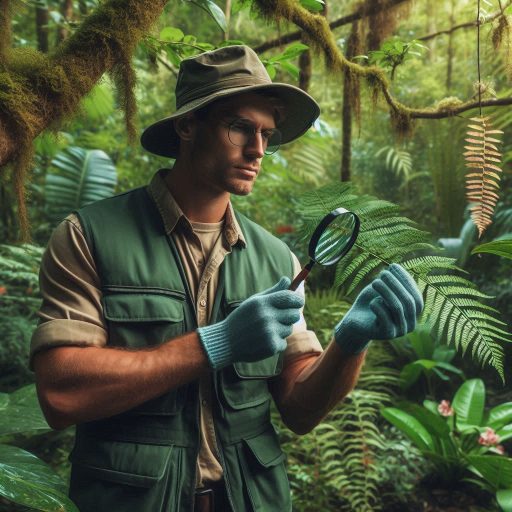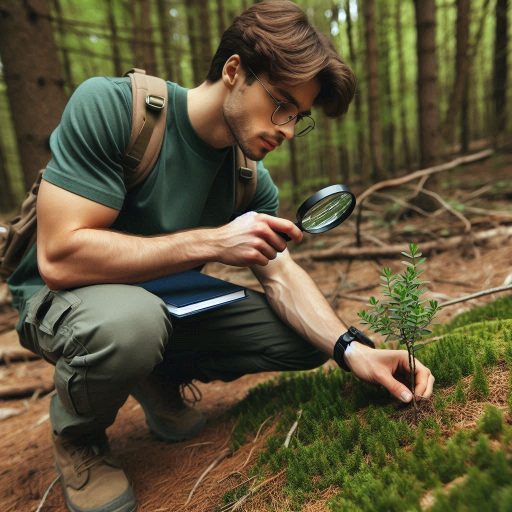Introduction
Ecologists study the relationships between living organisms and their environments.
They analyze ecosystems to understand how different factors affect biodiversity and ecological balance.
By researching plants, animals, and habitats, ecologists gather crucial data to inform conservation efforts.
Their work is vital for protecting the planet’s natural resources and biodiversity.
Ecologists help identify endangered species and their habitats, guiding conservation strategies.
They also assess the impact of human activities, such as pollution and deforestation, on ecosystems.
By advocating for sustainable practices, ecologists contribute to preserving ecosystems for future generations.
They collaborate with government agencies, non-profit organizations, and communities to implement conservation projects.
Furthermore, ecologists educate the public about environmental issues, fostering a greater awareness of conservation needs.
Their expertise supports the development of policies aimed at mitigating climate change and protecting natural habitats.
In general, ecologists play a crucial role in environmental conservation.
Their research and advocacy efforts are essential for maintaining ecological health and biodiversity.
By understanding ecosystems, they help ensure a sustainable future for our planet.
Education and Training Required to Become an Ecologist
Bachelor’s Degree in Ecology, Environmental Science, or Related Field
To pursue a career as an ecologist, you must start with a solid educational foundation.
Most ecologists begin by earning a bachelor’s degree in ecology, environmental science, or a related field.
These programs typically cover essential topics such as biology, chemistry, and environmental studies.
You will also explore specific areas like conservation biology, ecosystems, and biodiversity.
Coursework in statistics and data analysis is vital because ecologists often interpret large datasets.
A well-rounded undergraduate education equips aspiring ecologists with the necessary scientific knowledge and research skills.
Many universities offer specialized programs tailored to ecological studies.
It’s essential to choose a program that aligns with your interests and career goals.
Programs that offer hands-on lab work, field studies, and research opportunities can give you a competitive edge.
Advanced Degrees for Higher-Level Positions
While a bachelor’s degree qualifies you for entry-level roles, many ecologists pursue advanced degrees to advance their careers.
Obtaining a master’s or doctoral degree is crucial if you aim to secure higher-level positions in research, academia, or specialized environmental consulting roles.
Master’s programs in ecology or environmental science allow students to focus on specific areas, such as wildlife biology, marine ecology, or forest management.
These programs provide more in-depth knowledge and prepare you for leadership or research roles.
Doctoral degrees, on the other hand, are essential if you want to work in academia or lead significant research projects.
Having an advanced degree demonstrates your expertise in a specific niche and opens up more job opportunities.
Employers often seek candidates with specialized knowledge for positions that require advanced problem-solving and leadership abilities.
In addition to deepening your expertise, graduate programs often require original research, which can further build your professional reputation in the field.
Internships and Field Experience
While formal education is important, practical experience plays a crucial role in becoming an ecologist.
Internships and field experience offer valuable opportunities to apply what you’ve learned in real-world settings.
Many ecology programs encourage students to complete internships at environmental organizations, wildlife reserves, or government agencies.
These internships allow you to work alongside seasoned professionals, gaining firsthand experience in ecological research, data collection, and conservation efforts.
Field experience is essential because much of an ecologist’s work involves observing organisms and ecosystems in their natural environments.
Fieldwork allows you to learn techniques for studying plant and animal populations, conducting habitat assessments, and evaluating environmental impact.
It also helps you develop skills in handling field equipment and analyzing ecological data.
Becoming an ecologist requires a blend of education, advanced training, and hands-on experience.
By pursuing a bachelor’s degree, considering advanced education, and gaining practical experience, you will be well-prepared for a successful career in ecology.
Job duties and responsibilities of ecologists
Ecologists perform a variety of tasks that focus on understanding ecosystems and preserving the environment.
Their work involves conducting field research, analyzing data, consulting with organizations, and developing strategies for conservation.
Conducting Field Research to Study Ecosystems and Wildlife
Ecologists spend a significant amount of time in the field collecting data on ecosystems, wildlife, and plant species.
They monitor animal populations, assess biodiversity, and observe environmental conditions.
This hands-on research allows them to understand how ecosystems function and how human activities impact wildlife.
Ecologists use various tools, including GPS devices, drones, and sampling equipment, to gather accurate data.
Analyzing Data and Writing Reports
Once ecologists collect data from the field, they analyze it to identify trends, patterns, and changes within ecosystems.
They use statistical software and data analysis tools to interpret their findings.
Ecologists then compile these results into detailed reports.
These reports help communicate their research to other scientists, government agencies, and the public.
Writing clear and concise reports is crucial for ecologists, as their findings often influence environmental policies and management decisions.
Consulting with Government Agencies and Environmental Organizations
Ecologists frequently collaborate with government agencies and environmental organizations to address ecological concerns.
They provide expert advice on issues such as habitat destruction, pollution, and species conservation.
Ecologists help inform decision-makers by presenting scientific evidence and recommendations.
Their input is essential for developing policies that promote sustainable environmental practices and protect biodiversity.
By working closely with policymakers and organizations, ecologists contribute to shaping environmental laws and regulations.
Developing Conservation and Restoration Plans
A significant responsibility for ecologists is developing conservation and restoration plans.
They create strategies to protect endangered species, restore damaged ecosystems, and promote biodiversity.
These plans often involve habitat restoration, reforestation, and the reintroduction of species into their natural environments.
Ecologists also assess the impact of climate change and human activities on ecosystems to develop solutions that minimize harm.
They work with landowners, conservation groups, and governments to implement these plans effectively.
Ecologists ensure that restoration projects are based on scientific research, making them more likely to succeed.
They evaluate the progress of these efforts over time, making necessary adjustments to achieve the desired outcomes.
Ecologists play a vital role in preserving the natural world.
From conducting field research to developing conservation plans, their work is critical for understanding and protecting ecosystems.
They collaborate with various organizations and governments, using data-driven insights to influence policies and promote sustainable practices.
By performing these duties, ecologists help safeguard the environment for future generations, ensuring that biodiversity and ecosystems continue to thrive.
Read: How to Become a Licensed Chemist in the USA: Steps and Tips
Career Paths for Ecologists
Ecologists have diverse career paths across various sectors, each offering unique opportunities to apply their skills and knowledge.
Government Agencies (EPA, US Fish and Wildlife Service)
Ecologists can work for government agencies like the Environmental Protection Agency (EPA) or the US Fish and Wildlife Service.
These agencies focus on protecting natural resources, managing ecosystems, and enforcing environmental regulations.
Ecologists in these roles conduct field research, develop conservation strategies, and assess the impact of human activities on ecosystems.
For example, they may evaluate water quality, monitor endangered species, or restore damaged habitats.
Working in government positions provides ecologists with the opportunity to influence environmental policy and contribute to large-scale conservation efforts.
Nonprofit Organizations (Nature Conservancy, World Wildlife Fund)
Many ecologists pursue careers in nonprofit organizations like the Nature Conservancy and World Wildlife Fund (WWF).
These organizations focus on global conservation efforts, advocating for environmental protection and wildlife preservation.
Ecologists in nonprofits work on projects that protect biodiversity, combat climate change, and promote sustainable practices.
They may conduct research, engage in public outreach, or collaborate with local communities to promote conservation initiatives.
Consulting Firms
Ecologists often find rewarding careers in environmental consulting firms.
These firms provide expert advice to private companies, government agencies, and other organizations on how to minimize their environmental impact.
Ecologists in consulting firms conduct environmental assessments, help with land-use planning, and develop mitigation strategies for environmental risks.
They may work on projects related to renewable energy, urban development, or resource management.
Academic Institutions
For ecologists passionate about research and teaching, academia offers a fulfilling career path.
Ecologists in academic institutions, such as universities or research centers, focus on advancing ecological knowledge through research and educating the next generation.
They may conduct field studies, publish scientific papers, and mentor students pursuing degrees in ecology or environmental science.
Academic ecologists contribute to the development of new theories, techniques, and solutions for pressing environmental problems.
A career in academia allows ecologists to explore their research interests while fostering future leaders in the field.
Ecologists have diverse career paths in government, nonprofit, consulting, and academic sectors.
Each offers unique opportunities to make a meaningful environmental impact.
Whether shaping policy, driving conservation efforts, or advancing scientific knowledge, ecologists play a critical role in preserving our planet.
Exploring these career paths can help you find the best fit for your skills and passion for ecology.
Read: Biology Ethics: Navigating Complex Issues in the US
Job Outlook for Ecologists
The job outlook for ecologists is promising, with an increased focus on environmental issues driving demand.
As concerns over climate change, biodiversity loss, and sustainable development grow, ecologists play a crucial role in addressing these challenges.
Governments, NGOs, and private sectors are seeking professionals who can analyze ecosystems, recommend conservation strategies, and monitor environmental impacts.
Projected Growth in Demand for Ecologists
The U.S.Bureau of Labor Statistics projects a 5% growth rate for environmental scientists and specialists, including ecologists, between 2021 and 2031.
This growth reflects rising global awareness of ecological issues, prompting more investments in research, conservation, and environmental restoration.
Ecologists will be needed to guide policy decisions, develop sustainable practices, and monitor natural resources.
Organizations worldwide are recognizing the urgency of protecting ecosystems, resulting in more opportunities for trained ecologists.
Transform Your Career Today
Unlock a personalized career strategy that drives real results. Get tailored advice and a roadmap designed just for you.
Start NowOpportunities for Specialization
As ecological issues become more complex, ecologists can specialize in critical areas like climate change, biodiversity, and sustainability.
Specializing allows ecologists to address specific problems while enhancing their expertise and marketability.
For instance, climate change specialists focus on mitigating the impacts of global warming, helping organizations reduce carbon emissions.
Ecologists specializing in biodiversity work to preserve endangered species and habitats, ensuring long-term ecosystem health.
Sustainability experts help design eco-friendly solutions, guiding businesses and communities toward more sustainable practices.
These areas of specialization open doors to diverse career paths.
Ecologists can work for environmental consulting firms, research institutions, non-profit organizations, or corporations developing sustainable practices.
Specialization provides a competitive edge in the job market, especially as organizations increasingly seek expertise in these specific fields.
Competition in Certain Sectors
Despite the growing demand, competition for jobs in some sectors remains high.
Government positions, especially at agencies like the Environmental Protection Agency (EPA) or the U.S. Fish and Wildlife Service, attract many applicants.
These jobs offer stability, excellent benefits, and opportunities to influence policy.
Entry into these roles can be highly competitive, requiring not only a solid educational background but also practical experience and certifications.
To secure government jobs, ecologists must gain relevant certifications.
They should build strong fieldwork experience to enhance their qualifications.
Networking within the environmental community is also crucial for success.
Even in competitive fields, standing out through specialized skills and qualifications can improve job prospects.
The job outlook for ecologists remains optimistic, driven by growing concerns over environmental issues.
Specializing in areas like climate change, biodiversity, and sustainability creates new opportunities for ecologists.
Competition in government sectors emphasizes the need for advanced qualifications.
Ecologists with the right skills, certifications, and experience will find promising careers that contribute to solving some of the world’s most pressing environmental problems.
Read: Continuous Learning: Post-graduate Options for US Biologists

Salary potential for ecologists
Ecologists in the United States can expect competitive salaries, with various factors influencing their earning potential.
These factors include education level, experience, sector, and job title.
Understanding these elements can help aspiring ecologists make informed decisions about their career paths.
Median Salary for Ecologists in the U.S
The median salary for ecologists in the U.S. is approximately $73,230 per year, according to the U.S. Bureau of Labor Statistics (BLS) for environmental scientists and specialists.
This salary provides a strong foundation, especially for those entering the field with a degree and some experience.
Ecologists in the early stages of their careers may start at slightly lower salaries but can expect growth as they gain more expertise.
Factors That May Affect Salary
Several factors affect an ecologist’s salary.
Education is one of the most significant.
Ecologists with advanced degrees, such as a master’s or Ph.D., tend to earn higher salaries.
Employers often prefer candidates with specialized knowledge and research skills, which are typically gained through graduate-level education.
Additionally, experience plays a critical role in salary growth.
Ecologists with several years of fieldwork, research, and project management experience command higher pay.
Senior ecologists who lead teams or manage large projects often receive significantly higher compensation.
Location can also influence salary.
Ecologists working in urban areas or regions with a high demand for environmental work tend to earn more.
States like California, Washington, and Oregon, where environmental protection efforts are prioritized, often offer higher salaries.
However, ecologists in rural or less environmentally focused areas may see lower pay.
Salary Ranges for Different Sectors
The sector in which an ecologist works also impacts their salary.
Ecologists in the private sector, particularly in environmental consulting firms, typically earn higher salaries.
Those working for large corporations also earn more than their counterparts in non-profit organizations or government roles.
The private sector often compensates well for ecologists who provide services related to environmental compliance, sustainable development, and resource management.
Government positions, particularly at the federal level, offer stable salaries, but they are often lower than those in the private sector.
Ecologists working for the Environmental Protection Agency (EPA) or the U.S. Fish and Wildlife Service may start around $50,000 to $60,000 annually.
However, these positions provide job security and excellent benefits.
Non-profit organizations tend to offer lower salaries, with entry-level positions often starting around $40,000.
However, these roles provide meaningful work in conservation and environmental advocacy, attracting individuals passionate about making a difference.
The salary potential for ecologists varies based on education, experience, and the sector in which they work.
While government and non-profit roles offer stability, private sector positions often provide higher pay.
Ecologists with advanced education and specialized experience can expect more lucrative opportunities across various industries.
Read: US Chemistry Conferences and Symposiums to Attend in 2024
Skills and Qualities Needed to Succeed as an Ecologist
To thrive as an ecologist, individuals must possess a unique set of skills and qualities that enable them to navigate the field’s complexities.
Ecologists face diverse challenges, from conducting fieldwork to analyzing data and communicating findings to stakeholders.
The following key skills and traits are essential for success.
Transform Your Career Today
Unlock a personalized career strategy that drives real results. Get tailored advice and a roadmap designed just for you.
Start NowStrong Analytical and Problem-Solving Skills
Ecologists must have strong analytical and problem-solving skills to address complex environmental issues.
These professionals analyze large sets of data, often involving multiple variables, to understand ecosystems and environmental processes.
The ability to interpret data accurately is crucial for making informed decisions about conservation efforts and ecological management.
Problem-solving is equally important.
Ecologists encounter a wide range of challenges, from addressing declining biodiversity to developing strategies for habitat restoration.
Effective problem-solving requires the ability to think critically, identify underlying issues, and propose practical, science-based solutions.
Successful ecologists can tackle problems with creative approaches, often working within limited resources and constraints.
Attention to Detail
Attention to detail is a vital skill for ecologists, particularly when conducting fieldwork or analyzing data.
Small errors in data collection or interpretation can lead to inaccurate conclusions, which can affect conservation efforts or policy recommendations.
Whether collecting specimens, observing animal behavior, or measuring environmental factors, ecologists must remain meticulous in their work.
In research settings, attention to detail ensures that experiments are conducted accurately and that results are reliable.
This trait is vital when handling sensitive equipment or studying endangered species.
Precision often determines the success of conservation strategies.
Ability to Work Independently and as Part of a Team
Ecologists often work independently during field research, but collaboration is also essential.
They must be comfortable conducting solo fieldwork in remote areas, sometimes for extended periods.
Independent work requires self-discipline, initiative, and the ability to stay organized without constant supervision.
At the same time, ecologists frequently collaborate with other scientists, policymakers, and stakeholders.
Successful ecologists work effectively as part of a team.
They share research findings, coordinate conservation projects, and contribute to environmental assessments.
Strong interpersonal skills are necessary for building productive working relationships and ensuring that ecological efforts are well-coordinated.
Strong Communication and Writing Skills
Effective communication is crucial for ecologists, both in writing and speaking.
Ecologists must communicate complex scientific findings to diverse audiences, including government agencies, conservation groups, and the general public.
Clear communication ensures that ecological research informs policy decisions, environmental management strategies, and public awareness campaigns.
Strong writing skills are essential for producing research papers, grant proposals, and reports.
Ecologists often publish their findings in scientific journals, where clarity and precision are critical.
Additionally, they must tailor their communication to non-scientific audiences, making complex topics accessible to the public.
To succeed as an ecologist, individuals must develop strong analytical skills.
They should pay close attention to detail.
Ecologists need to work independently and collaboratively.
Excellent communication abilities are essential for effective teamwork.
These traits equip ecologists to address environmental challenges effectively and make meaningful contributions to conservation and sustainability efforts.
Job Satisfaction and Challenges of Working as an Ecologist
Working as an ecologist offers immense satisfaction, but it also comes with unique challenges.
Ecologists are driven by a passion for the environment and a desire to make a lasting impact on ecosystems and conservation efforts.
However, the nature of the job can be demanding, with long hours, fieldwork in remote locations, and limited resources.
Below are some key aspects of job satisfaction and the challenges faced in this career.
Fulfilling Work That Positively Impacts the Environment
One of the most rewarding aspects of being an ecologist is the opportunity to make a real difference in preserving and protecting the environment.
Ecologists study ecosystems, biodiversity, and environmental changes, often contributing to conservation efforts that protect endangered species and habitats.
Knowing that their work helps maintain the balance of nature and promotes sustainability is highly fulfilling for ecologists.
Ecologists play a crucial role in addressing pressing global issues like climate change, deforestation, and pollution.
They provide valuable data and recommendations that inform policy decisions and guide environmental management.
The sense of purpose and accomplishment that comes from contributing to these vital causes makes the career incredibly rewarding.
Challenges: Long Hours and Fieldwork in Remote Locations
Despite the job’s many rewards, ecologists face significant challenges.
Fieldwork is a core component of the profession, and it often involves long hours and working in remote, sometimes harsh, environments.
Ecologists may spend weeks or months in the field, conducting research in difficult-to-reach locations.
This can include rugged terrains, extreme weather conditions, and limited access to basic amenities.
Fieldwork can also be physically demanding, requiring ecologists to hike, carry equipment, and stay outdoors for extended periods.
While this can be exhilarating for those who love nature and adventure, it can be challenging for others.
The long hours and isolated conditions can also take a toll on personal life, making it difficult to balance work and family commitments.
Budget Constraints
Another common challenge ecologists face is budget constraints.
Many ecological research projects and conservation initiatives rely on limited funding, which can restrict the scope of their work.
Ecologists may struggle to secure financial support for long-term projects, and budget cuts can lead to a lack of resources, including staff and equipment.
This can slow progress and make it harder to achieve desired outcomes in conservation and environmental research.
Opportunities for Professional Development and Advancement
Despite the challenges, there are numerous opportunities for professional growth in ecology.
Ecologists can specialize in various fields such as conservation biology, climate change, or restoration ecology.
As they gain experience, they can advance to leadership roles, manage research projects, or consult for government agencies and environmental organizations.
Additionally, continuous learning through certifications and workshops allows ecologists to stay updated on the latest tools and techniques in the field.
Working as an ecologist offers a fulfilling career dedicated to environmental protection but also comes with challenges like fieldwork and budget limitations.
Despite these obstacles, the opportunities for professional growth and the impact ecologists make on the environment make it a rewarding path.
Conclusion
A career in ecology offers a fulfilling path for those passionate about the environment.
As we’ve covered, ecologists play a critical role in addressing global environmental issues such as climate change, biodiversity loss, and sustainability.
The demand for ecologists is projected to grow as environmental concerns continue to rise.
Despite some challenges, such as remote fieldwork and budget constraints, ecologists find their work rewarding due to the positive impact they make.
With opportunities for specialization in areas like conservation, wildlife biology, and ecosystem management, ecologists can tailor their careers to their specific interests.
If you’re considering a career in ecology, focus on gaining the necessary skills, such as analytical thinking, problem-solving, and strong communication.
Education, experience, and certifications can help advance your career and improve your job prospects.
For anyone dedicated to protecting the planet, ecology offers a meaningful and impactful career path that combines science with real-world applications.
Now is the time to explore your options and start building a career that contributes to environmental sustainability.
[E-Books for Sale]
The Big Book of 500 High-Paying Jobs in America: Unlock Your Earning Potential
$19.99 • 500 High-Paying Jobs • 330 pages
Explore 500 high-paying jobs in America and learn how to boost your career, earn more, and achieve success!
See All 500 High-Paying Jobs of this E-Book
1001 Professions Without a Degree: High-Paying American Jobs You Can Start Now
$19.99 • 1001 Professions Without a Degree • 174 pages
Discover 1001 high-paying jobs without a degree! Unlock career tips, skills, and success strategies for just $19.99!




